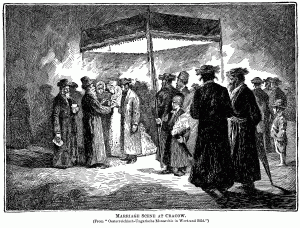I recall an occasion that we hosted a Sheva Brachot in our home. A Sheva Brachot is one of seven traditional celebratory meals held for a bride and groom in the week after their marriage. In addition to the Sheva Brachot, I attended the wedding, and much to my surprise, was called upon to be one of two witnesses to the event which was to take place under the chuppah that evening.
Before the giving of the Torah, if a man and woman wanted to get married, they would simply agree on it and then move in together (Maimonides, Laws of Marriage 1:1). However, once the Torah was given, marriage took on a new meaning. When a couple desires to get married, they must follow the laws as set forth in the Talmudic tractate of Kiddushin, which are derived from this week’s Torah portion, Ki Teitzei (Deut. 22:13).
Although the customs and laws of marriage are plentiful, it seems to me that perhaps the most common misconception is that a rabbi must be present to officiate. In fact, a rabbi is not necessary at all for a couple to get married! Jewish law merely requires a willing man and woman; a ring of minimal value without gems (generally of gold; although some have the custom to use silver, because the Hebrew word for silver is etymologically related to the word meaning “to yearn”); and two witnesses who fulfill the characteristics as discussed in the Code of Jewish Law (the scope of which is beyond the pale of this essay). In a traditional Jewish wedding ceremony, witnesses are indispensible; without them, the marriage is considered null, as if it had never taken place.
Let us analyze for a moment the concept of witnesses in Jewish law. There are actually two types of witnesses. The first are known as “clarifying witnesses,” while the others are referred to as “establishing witnesses.”
The framework of the first set of witnesses is to testify whether a certain event did or did not occur. For example, two witnesses may testify that person A lent $100 to person B. The loan occurred regardless of the witnesses’ testimony; the testimony merely affirms it in a court of law, and any legal proceedings can be made based on that evidence.
“Establishing witnesses,” on the other hand, play a completely different role. They do not merely testify to an event that did or did not happen; but rather, they establish the event. That is to say, that there are certain types of events (marriage, as noted above) that require the presence of witnesses to establish the veracity of the event. If witnesses are not present at the said event, Jewish law considers the event simply to not have happened. In other words, establishing witnesses create the event.
We can view these two types of witnesses not only in a legal sense, but also through a psychological lens. Each type of witness represents a different type of relationship with our Creator. Known as the Chosen People, each one of us is a witness to G-d’s presence in the world. However, one may say, that it is incumbent upon each and every one of us to choose which type of witness we will be.
In the psychological or spiritual sense, a clarifying witness indeed has a relationship with the Creator; however, that relationship is not one that s/he pursues actively, nor one that s/he seeks to express. If asked, a clarifying witness will indeed testify to his or her Jewishness and belief in a Supernal Being. Yet it is not something that is actively pursued.
An establishing witness is a much different persona. Such a witness in the spiritual-psychological life yearns and strives for a relationship with the Primary Being. Status-quo will not suffice. An establishing witness does not merely reply, “Yes, I am a Jew” when probed; he or she seeks opportunities to “testify” about G-d’s presence in the world, and the actively generate the relationship.
This framework can also be extended to our interpersonal relationships. For example, one who is married may simply state, “Yes, I am married” (clarifying witness) – or s/he may actively pursue ways to deepen and strengthen that relationship (establishing witness). If one thinks for a moment, it is quite apparent how this can apply in different ways within different relationships.
So next time you attend a wedding and the witnesses are called to observe the chuppah process, think for a moment: If I were a witness, what type of witness would I be?

